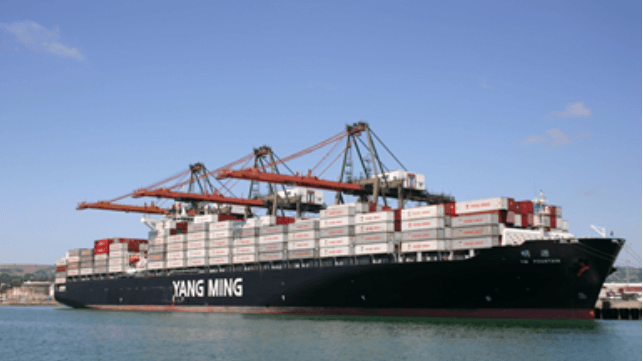First of Two FMC Complaints by Shippers Settled with Yang Ming

The surge in shipping volumes and related problems through the supply chain over the past two years has given rise to many complaints from shippers over the business practices of the major shipping companies that contributed to an increased focus on regulations. The Federal Maritime Commission this week confirmed that the first of two complaints pending against Yang Ming alleging a denial of service and price manipulation of the market has been settled while the second complaint has also been reduced in scope dropping allegations of broader collusion among carriers.
The complaint filed by a New Jersey-based home furnishings company, Achim Importing, raised similar issues to those cited by many smaller shippers. They contended that the carriers have been denying service and not honoring their freight contracts instead forcing these smaller companies into the spot market at a time when prices had skyrocketed. While many shippers have complained of similar experiences, Achim was one of a few that have filed complaints with the FMC seeking specific damages.
Achim in its complaint filed in March 2022 alleged that Yang Ming had “taken advantage of price inflation in container shipping during the COVID-19 pandemic and unjustly and unreasonably exploited customers.” The complaint laid out allegations that the carrier deliberately constrained capacity to manipulate pricing, sought to take advantage of unprecedented high pricing by forcing shippers with service contracts to resort to spot market purchases to secure freight carriage and benefited from being able to sell previously contracted capacity on the spot market, or to shippers willing to pay a premium, rather than honoring its service contract commitments.
The company said it had entered into a contract with Yang Ming to transport 200 TEU between May 2020 and April 2021 between China and the United States. They reported that they had only been able to ship a total of 31 containers under the contract and were forced into the spot market for their shipments. However, they contend that freight forwarders at the same time were offering space at might higher prices aboard the same Yang Ming vessels that were rejecting the contracted services. When Achim confronted Yang Ming’s representatives they were told in an email that the carrier was focusing on larger carriers that were providing weekly shipments.
As a result of the denial of service the company reported it had spent more than $1.3 million more than the contracted prices to ship the 169 TEUs not carried under its contract. The details of the settlement between Yang Ming and its customer remain confidential, but the FMC accepted the agreement following its policy that encourages settlements to resolve complaints including violations of the Ocean Shipping Act. The companies said the settlement agreement is intended to restore and reinforce their long-standing business relationships.
The second similar complaint filed in May 2022 by an Illinois-based manufacturer and importer of gourmet foods and food gifts contained similar complaints on the denial of service from both Yang Ming and HMM and also charged collusion between the carriers. In July, the lawyers successfully argued to narrow the case with the shipper agreeing to narrow the complaint, drop the allegation of collusion, and refile separate cases against each of the carriers.
The case that was refiled in August, contains similar allegations of a denial of service, which the company said has cost it more than $1 million. They had a contract for 100 TEU reporting however that Yang Ming carried just four containers between May and December 2021.

that matters most
Get the latest maritime news delivered to your inbox daily.
“Even with currently reviving demand, however, global ocean carriers have not returned to the just and reasonable pricing and contracting practices of pre-pandemic times,” they write in the complaint which was received by the FMC on August 19. “Instead, they have continued policies and practices that manipulate prices and deliver unprecedented windfall profits to them by forcing shippers into an artificially inflated spot market.”
The repeated complaints by shippers similar to these along with the complaints from exporters of a denial of service empowered Congressional action to reform the Ocean Shipping Act and increase the enforcement authority of the FMC. The carriers face increased regulations including reporting requirements to document the movement of containers and exports from the United States all to reduce the complaints over denial of service.
